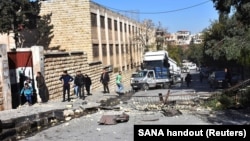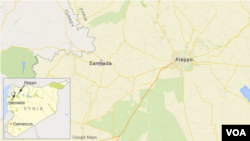The Pentagon says a U.S. drone strike in northwestern Syria last week killed a senior al-Qaida leader with ties to terrorist groups operating across wide swaths of southwest Asia.
A Pentagon spokesman said Tuesday the strike targeted Egyptian national Abu Afghan al-Masri on November 18, near the town of Sarmada, 50 kilometers west of Aleppo.
"He has been on our radar for some time," said spokesman Peter Cook, who also said al-Masri had direct links to extremists responsible for attacking U.S. and coalition forces in Afghanistan. He further described al-Masri as later joining a Syrian affiliate and said he also plotted attacks on the West.
Meanwhile, monitors in and near the embattled city of Aleppo reported Russia-backed Syrian forces and their Shi'ite Hezbollah allies pushing deeper into opposition-occupied neighborhoods, as they press an offensive to recapture the rebel-held city.
Continuous bombardment
The Syrian Observatory for Human Rights said warplanes and helicopters bombed two key neighborhoods for an eighth straight day. A spokesman placed the death toll at 27 civilians in the past two days from airstrikes and artillery, and warned that casualty figures were near certain to rise.
The observatory has tallied 143 civilian deaths, including 19 children, since the latest government assault began last week.
At the United Nations Monday, U.S. Ambassador Samantha Power said monitors have confirmed nearly 300 people killed in eastern Aleppo in recent days, and said one Syrian volunteer had reported 180 airstrikes on Saturday alone.
"The reality is that the regime [of Syrian President Bashar al-Assad] and Russia are continuing their 'starve, get bombed or surrender' strategy in eastern Aleppo," she said.
Power also scoffed at a two-week Russian bombing lull touted by Moscow earlier this month, calling it a "unilateral" exercise in which the Kremlin failed to coordinate with U.N. relief workers or other organizations trying to get emergency aid to Aleppo's war-ravaged civilians.
'Takes your breath away'
In a separate critique, U.N. special envoy Stephen O'Brien told the U.N. Security Council that Syrian-Russian airstrikes on civilian infrastructure, "most notably hospitals and schools, have become so commonplace it takes your breath away."
Moscow and Damascus have routinely described the fight against rebels in eastern Aleppo as a battle against terrorists, despite the sector's vast civilian population trapped in the city and described by witnesses as largely too fearful to flee.
Both governments have used that characterization to justify the deadly and apparently indiscriminate bombings in eastern Aleppo that began in September.
Western governments and the United Nations have framed the Aleppo onslaught as a vast humanitarian crisis, with diplomats and human rights organizations arguing that both Damascus and Moscow could face future war crimes inquiries for their roles in the destruction of eastern Aleppo.






